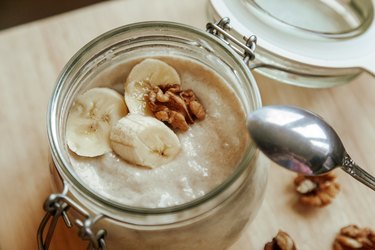
When you feel the soothing coolness of milk or yogurt as it goes down your throat, it might seem like these foods could be good for easing that burning sensation that comes with acid reflux. But are they?
Acid reflux occurs when stomach acid moves back up into the esophagus, where it can cause heartburn.
Video of the Day
Video of the Day
"In the 1950s, before there were effective acid reflux medications, there was the 'Sippy Diet' for peptic ulcers," explains Elie Abemayor, MD, who chairs the division of gastroenterology at Northern Westchester Hospital in Mount Kisco, New York. "It was a diet of mostly white things — bread, milk, yogurt — that were thought to buffer the stomach and reduce acid. But, if some foods temporarily neutralize the stomach acid, they don't heal ulcers."
So while some people might feel a little short-term relief from some foods, like milk or yogurt, the underlying cause may still be there, he says. However, the beneficial bacteria, called lactobacillus, that is found in yogurt might help in the long run.
"Yogurt may not directly help with acid reflux symptoms, [but] the lactobacillus present in yogurt may assist in overall digestive health," says Sang Hoon Kim, MD, chief of the division of gastroenterology at NewYork-Presbyterian Medical Group Queens in Fresh Meadows, New York.
He says there's one caveat, though. If you're lactose intolerant, your inability to digest the lactose in yogurt may lead to more problems. "It may cause gas formation and belching, which can eventually bring up acid, thereby worsening the symptoms of your acid reflux," Dr. Kim says.
Is There a Heartburn Diet?
There's no specific diet for preventing heartburn, but some foods are less likely to lead to acid reflux. Some examples include:
- Lean sources of protein. Chicken, turkey and fish are all good sources of lean protein. Be sure to grill, poach, broil or bake these foods, because frying them makes them more likely to cause heartburn. The International Foundation for Gastrointestinal Disorders (IFFGD) says that egg whites are another lean source of protein unlikely to contribute to heartburn.
- Certain fruits. Milder-tasting fruits — like bananas, apples, pears and melon — probably won't lead to heartburn, the IFFGD says.
- Lighter types of fat. Foods that contain monounsaturated or polyunsaturated fats may help keep your digestive woes at bay. Avocados, flaxseed, nuts and other seeds are healthy types of fats. If you're looking for oil, try olive, sesame, canola, safflower, soybean and sunflower, the IFFGD suggests.
- Mellow vegetables. Potatoes and other root vegetables can be a good choice for people with heartburn. But be careful not to add garlic or onion when preparing these foods.
- Whole grains and brown rice.
Whole grain bread, oatmeal, brown rice and couscous provide fiber and
other nutrients without boosting your acid reflux risk, the IFFGD says.
Foods That Might Cause Symptoms
There are plenty of foods that can trigger or aggravate acid reflux. Here's a list of some common offenders from University Hospitals and the IFFGD:
- Coffee and tea.
- Alcohol.
- Chocolate.
- Onions and garlic.
- Citrus fruits, such as oranges and grapefruits.
- Peppermint.
- Carbonated beverages.
- Tomatoes, ketchup, tomato soup and marinara sauce.
- Fried foods, including fried
chicken and fish, french fries and onion rings.
Read more: The 10 Worst Foods for Acid Reflux
Lifestyle Changes That Can Help
Besides watching what you eat, changing certain lifestyle habits also can help. For instance, cut out late-night snacking, suggests University Hospitals. Stop eating about two hours before you go to sleep.
Smaller, more frequent meals can also help prevent heartburn. Larger meals may put pressure on the valve between the stomach and the esophagus, allowing stomach acid into the esophagus, notes the National Institute of Diabetes and Digestive and Kidney Diseases.
It also helps to stay upright and maintain good posture after eating. This helps avoid putting too much pressure on your stomach, and keeps stomach acid from leaking into your esophagus, the IFFGD says. Walking around after eating can help, too.
Chewing gum increases saliva, which lessens how much acid is in the esophagus. Be sure not to chew peppermint or spearmint gum, however. The IFFGD says those flavors can relax the valve between the stomach and esophagus.
- Sang Hoon Kim, MD, chief, division of gastroenterology, NewYork-Presbyterian Medical Group Queens, Fresh Meadows, New York
- International Foundation for Gastrointestinal Disorders: "Diet Changes for GERD"
- Elie Abemayor, MD, chair, division of gastroenterology, Northern Westchester Hospital, Mount Kisco, New York
- University Hospitals: "The Best and Worst Foods for Acid Reflux"
- National Institute of Diabetes and Digestive and Kidney Diseases: "Eating, Diet, and Nutrition for GER and GERD"
Is this an emergency? If you are experiencing serious medical symptoms, please see the National Library of Medicine’s list of signs you need emergency medical attention or call 911.